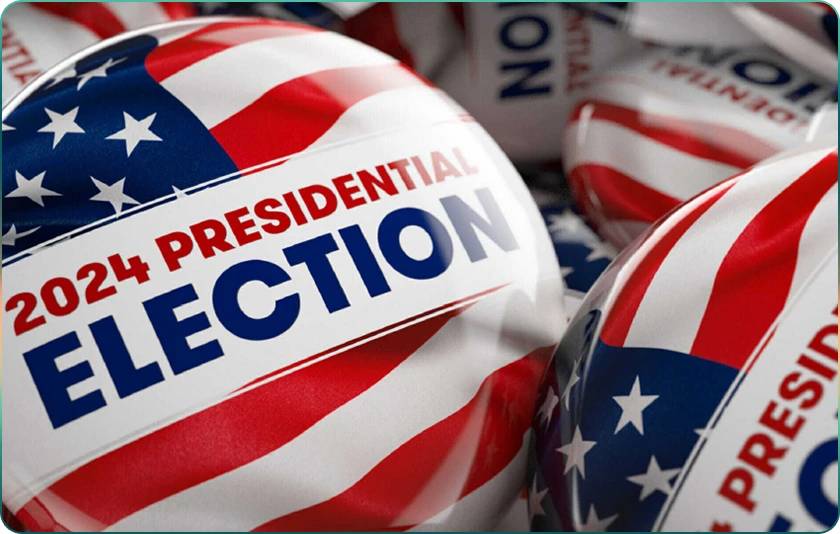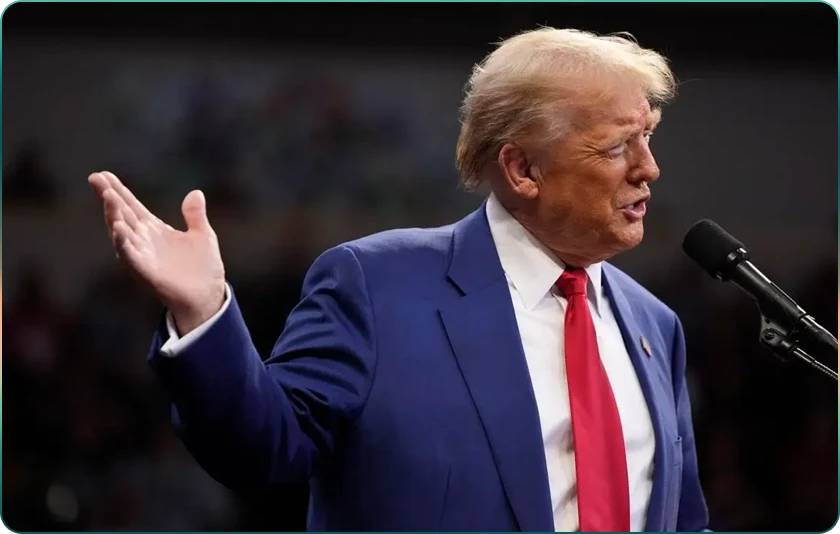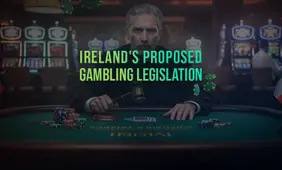2024 Presidential Election’s Role in Defining America’s Gambling Landscape

Harris or Trump, November’s U.S. election will have enormous implications on world events; and that includes gambling.
With the 2024 U.S. presidential election around the corner, the question of its impact on sports betting and casino legalization looms large. As the US gambling market continues to grow, fueled by an increasing number of states legalizing sports betting, the election could have a profound impact on how the industry evolves. Both Donald Trump and Kamala Harris, representing the two dominant political ideologies in the country, have indirect links to sports betting through the policies and governors they support.
The gambling industry is already bracing for what could be a significant turning point, and key players on both sides of the political spectrum are poised to influence the trajectory of legalization. In this article, we will explore the potential impact of a Trump or Harris victory on the sports betting landscape, highlight the key governors and their role in shaping state gambling laws, and delve into how the election could affect the broader gambling industry in the U.S.

The Rise of Sports Betting in America: A Brief Overview
Sports betting has experienced a seismic shift in the U.S. since 2018, when the Supreme Court struck down the Professional and Amateur Sports Protection Act (PASPA), which had effectively banned sports betting outside of Nevada. In the years since, dozens of states have moved to legalize sports betting, creating a patchwork of regulations across the country. Each state has crafted its own approach, with some fully embracing mobile and online wagering, while others have restricted betting to physical locations or outright banned it.
The momentum behind online gambling and sports betting is largely driven by the potential for significant tax revenues. Pennsylvania and New Jersey online casinos have brought billions in revenue since legalizing, using the funds to support infrastructure, education, and public services. Meanwhile, states like Texas, California, and Florida remain untapped markets, with politicians divided on whether to embrace the industry.
As we approach the 2024 election, sports betting has become a topic of debate for both Republicans and Democrats, with prominent figures on both sides weighing in on its future. While Trump’s more business-friendly approach might encourage deregulation, Harris and her allies may push for greater federal oversight, consumer protections, and a more uniform gambling framework across the states.
Donald Trump’s Business-Oriented Approach to Gambling
The ties Donald Trump has to the gambling industry are well-known. As a former casino owner, Trump once operated several high-profile casinos in Atlantic City. Although these ventures ultimately faced financial difficulties, Trump’s experiences in the industry have shaped his views on gambling, particularly his support for deregulation and free-market policies. If Trump wins the 2024 election, it’s likely that his administration would take a hands-off approach, allowing states to continue crafting their own gambling laws without significant federal interference.
Several Republican governors who align with Trump’s political ideology are already pushing for gambling expansion in their states. These figures — like Texas’s Greg Abbott and Arkansas’s Sarah Huckabee Sanders — could play a crucial role in shaping the future of sports betting in key markets.
Kamala Harris: A Progressive Approach to Gambling?
Kamala Harris, on the other hand, represents a different political ideology that could shape gambling in the U.S. in a very different way. While Harris hasn’t taken a strong public stance on sports betting, her progressive allies and the Democratic Party’s platform could influence how her administration handles the issue. Democrats have historically been more cautious when it comes to gambling, often emphasizing consumer protections, responsible gaming measures, and federal oversight.
If Harris wins the 2024 election, it’s likely that her administration will advocate for more robust gambling regulations, particularly when it comes to protecting consumers from problem gambling and ensuring that states adopt uniform standards for operators.
A number of Democratic governors are strong proponents of sports betting, and they’ll almost definitely play key roles in shaping this agenda: will Harris’s running mate and Minnesota governor Tim Walz continue to push legislation through, arguing (as he has done so far) that sports betting could bring in much-needed revenue for the state? And in California, meanwhile, will governor Gavin Newsom turn his state into the country’s biggest sports betting market of all?
Governors: The Real Power Behind Gambling Expansion
While the presidential election will undoubtedly influence the future of sports betting, it’s ultimately the governors who hold the keys to legalization in their states. Since the repeal of PASPA, governors have played a pivotal role in determining whether their states embrace or reject sports betting. Some have been eager to tap into the revenue potential, while others have remained resistant, citing moral or social concerns. These governors are the key players in the future of American betting.
Greg Abbott (Texas)
Texas, the second-largest state by population, is one of the biggest potential sports betting markets in the U.S. While Texas is historically conservative and has resisted gambling expansion, Governor Greg Abbott's shifting stance offers a glimmer of hope for gambling advocates. Over the last few years, Abbott has hinted at a potential openness to sports betting, particularly as the state's budget faces significant shortfalls due to economic pressures and natural disasters.
Abbott’s evolution on this issue reflects broader changes within the Republican Party. Traditionally, many Republicans have opposed gambling on moral or religious grounds, but a growing number now see it as a pragmatic solution to budgetary woes. The significant tax revenues generated by sports betting in other states have become too tempting to ignore. Abbott's softening position could signal a monumental shift, particularly if Donald Trump returns to the White House and continues to promote a hands-off, state-driven approach to gambling regulation.
Ron DeSantis (Florida)
Governor Ron DeSantis has already had his share of controversy when it comes to gambling. Florida’s Seminole Tribe holds an exclusive compact to offer casino gaming and, as of 2021, sports betting in the Sunshine State. However, legal challenges have thrown the state’s sports betting market into limbo, leaving operators and bettors in a state of uncertainty.
DeSantis, a former ally of Trump (at least until Trump started calling his Republican primary rival “Ron DeSanctimonious”), has shown a willingness to navigate the complex web of tribal interests, state lawmakers, and federal regulations. His leadership on the issue will be crucial, as Florida represents one of the most lucrative untapped markets for sports betting in the U.S. Should Trump win the 2024 election, DeSantis could have even more latitude to negotiate a new compact with the Seminole Tribe or push for broader legalization. However, the issue remains politically sensitive, and DeSantis will need to balance competing interests carefully.
Gavin Newsom (California)
California is the ultimate prize in the world of U.S. sports betting. With a population of nearly 40 million people and an economy larger than many countries, the Golden State represents the largest potential sports betting market in the nation. Governor Gavin Newsom, a prominent Democratic leader, has expressed support for legalizing sports betting, but the state’s powerful Native American casinos and tribal gaming interests have complicated matters for all interested parties.
In 2022, competing ballot measures that would have legalized sports betting failed, largely due to opposition from Native American tribes who control much of California’s gambling industry. Newsom will need to navigate these tribal interests if he hopes to bring sports betting to California. If Kamala Harris wins the presidency, Newsom could find an ally in pushing for federal guidelines that provide clarity on tribal and state gambling agreements. However, any move toward sports betting in California will likely be a slow and politically fraught process.
J.B. Pritzker (Illinois)
Illinois has been a model of sports betting success, with Governor J.B. Pritzker leading the charge. Since legalizing sports betting in 2020, Illinois has become one of the top markets in the U.S., generating significant tax revenue and establishing itself as a hub for online and mobile wagering. Pritzker’s success in this area has made him a key figure in the national conversation about sports betting, and his leadership could influence other states as they consider their own legalization efforts.
A Harris administration might look to governors like Pritzker to help craft a more uniform federal framework for sports betting. Illinois’ success shows that with the right regulations and a robust tax structure, sports betting can be a boon for state economies. If more states follow Pritzker’s lead, the U.S. could see a wave of new markets opening up in the coming years.
Tim Walz (Minnesota)
Minnesota remains one of the few states in the Midwest that has yet to legalize sports betting, but Governor Tim Walz has been a vocal advocate for change. Walz sees sports betting as a way to generate revenue for education and healthcare, two areas that are central to his progressive agenda. However, the state’s divided legislature has made it difficult to pass comprehensive gambling legislation.
Walz’s efforts will likely get a boost if Harris wins the 2024 election, as many progressive governors will feel emboldened to pursue their policy goals. Harris has emphasized the importance of consumer protections and responsible gaming, which align with Walz’s vision for regulated sports betting in Minnesota. If Walz is successful, Minnesota could become a key player in the Upper Midwest, joining neighbors like Iowa and Wisconsin in offering legal sports betting.
The Unlikely Holdouts: States Still Resisting Gambling Expansion
While many states are moving toward legalizing sports betting, some remain staunchly opposed to any form of gambling expansion. Moral objections, religious beliefs, and fears about the social costs of gambling have kept these states from embracing the industry. However, even in these states, pressure is mounting from both lawmakers and the public, as neighboring states reap the benefits of legalized sports betting.
Kay Ivey (Alabama)
Alabama remains one of the states most resistant to gambling. Governor Kay Ivey, a traditional conservative, has opposed efforts to legalize sports betting and other forms of gambling, citing concerns about addiction and the moral implications of gambling. Alabama’s conservative culture has made it a tough market for gambling proponents, and it’s unlikely that Ivey will change her stance in the near future.
However, neighboring states like Mississippi and Tennessee have already legalized sports betting, putting pressure on Alabama to reconsider. As more Alabamians cross state lines to place bets, the state is missing out on potential revenue. A Trump victory could embolden Ivey to maintain her opposition, while a Harris administration might push for more consumer protections that could make sports betting more palatable to conservative voters.
Tate Reeves (Mississippi)
Mississippi was one of the first Southern states to embrace sports betting, having legalized retail sports wagering in 2018. However, Governor Tate Reeves has been hesitant to expand into mobile or online betting, which has limited the state’s growth in the industry. Reeves, a conservative Republican, has expressed concerns about the social impacts of gambling, particularly on vulnerable populations.
Despite these concerns, there’s growing pressure on Reeves to expand Mississippi’s sports betting market. Neighboring Tennessee, which offers mobile betting, has outpaced Mississippi in terms of revenue, and many Mississippi residents are calling for the state to follow suit. If Trump wins the 2024 election, Reeves may feel more comfortable maintaining his cautious approach, while a Harris victory could prompt a reevaluation of the state’s gambling policies.
Political Betting - A Growing Market?
One of the more intriguing developments in the gambling industry has been the rise of political betting. While the U.K. and other international markets have embraced betting on elections for years, the U.S. remains hesitant. Currently, political betting is largely prohibited, with only a few overseas sportsbooks offering limited markets for U.S. elections.
The 2024 election could change that. As political futures markets grow in popularity, there’s increasing interest in bringing political betting to the U.S. Proponents argue that it would generate significant revenue, while opponents raise concerns about the ethics of betting on elections and the potential for increased political corruption.
A Trump victory could open the door to the liberalization of political betting, particularly if his administration takes a hands-off approach to gambling regulation. Harris, on the other hand, might push for tighter restrictions on political betting, emphasizing the potential risks to the democratic process.

What’s at Stake for the Gambling Industry?
The outcome of the 2024 election will have a major impact on the future of the gambling industry. While sports betting continues to grow, the regulatory landscape remains fragmented, with each state crafting its own rules. A Trump victory could accelerate the expansion of gambling by allowing states greater freedom to set their own policies, while a Harris administration might push for more uniform regulations and stronger consumer protections.
The potential for new markets is enormous. States like Texas, California, and Florida represent billions in untapped revenue, and the decisions of their governors will be crucial in determining whether those markets open up. At the same time, the rise of mobile betting, online casinos, and even political betting could create new opportunities for growth—if the regulatory framework allows it.
The 2024 Election: A Gamble on the Future
As we approach the 2024 election, the stakes for the U.S. gambling industry have never been higher. With billions in potential revenue and new markets waiting to be unlocked, the election outcome will play a critical role in shaping the future of sports betting, casino legalization, and even political betting. Donald Trump’s pro-business, deregulation-focused stance could see rapid expansion, while Kamala Harris’ progressive approach may lead to tighter oversight and a more consumer-focused regulatory environment.
Ultimately, the decision will rest not only with the president but with the governors and state legislatures, who hold the power to legalize or restrict sports betting within their jurisdictions. With key states like Texas, California, and Florida still on the fence, the 2024 election could usher in a new era of gambling expansion—or lead to a slower, more measured approach.
For the gambling industry, the stakes are high, and everyone is placing their bets on what comes next. Whether Trump or Harris wins, one thing is certain: the landscape of sports betting and casino legalization in the U.S. will be profoundly shaped by the outcome of this election. For now we can only speculate on what it will do for the rest of the world. Please gamble responsibly.





Review this Blog
Leave a Comment
User Comments
comments for 2024 Presidential Election’s Role in Defining America’s Gambling Landscape